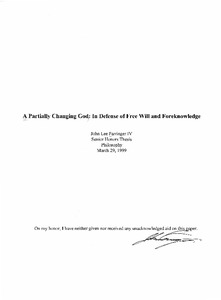| dc.rights.license | In Copyright | en_US |
| dc.creator | Farringer, John Lee, IV | |
| dc.date.accessioned | 2023-10-20T17:40:38Z | |
| dc.date.available | 2023-10-20T17:40:38Z | |
| dc.date.created | 1999 | |
| dc.identifier | WLURG038_Farringer_thesis_1999 | |
| dc.identifier.uri | https://dspace.wlu.edu/handle/11021/36386 | |
| dc.description.abstract | In this thesis I will begin with a libertarian view of human free will, one in which we are able to be active agents in freely choosing our own actions. At the same time, I will assume that
there is a God, and that He is omnipotent, omniscient, and benevolent. This God, I will assume, created the world as well as human beings and all creatures that live in it, and continues to interact with His creations. To what degree, then, can He also be omniscient without limiting our freedom? That is the question I wish to explore. Even if one does not believe in God, or thinks He does not have knowledge of future human actions, or even believes that human beings do not have free will, this problem is at least interesting conceptually. As long as it is
conceivable that there is an omniscient Divine Being, then exploration of the consequences of such a notion on human freedom is important. The goal of this paper is to allow for a God that knows not only what we will choose to do, but also how and when we will freely choose to do it. After dismissing three classical attempts at solutions to the problem by Aquinas,
Ockham, and Molina, I will offer a different approach. My ideas are based, first of all, upon Augustine's argument that knowledge does not entail necessity, but in fact guarantees freedom if what God foresees is a free choice. Secondly, I will take the view that God restrains Himself within time in order to give human beings the gift of freedom. Lastly, I will reconstruct a form of process theism that allows for God to change in time yet remain eternally omniscient. Finally, I will conclude this paper with a discussion of where the line must be drawn beyond which we admit that we simply cannot understand every aspect of God. [From Introduction] | en_US |
| dc.format.extent | 41 pages | en_US |
| dc.language.iso | en_US | en_US |
| dc.rights | This material is made available for use in research, teaching, and private study, pursuant to U.S. Copyright law. The user assumes full responsibility for any use of the materials, including but not limited to, infringement of copyright and publication rights of reproduced materials. Any materials used should be fully credited with the source. | en_US |
| dc.rights.uri | http://rightsstatements.org/vocab/InC/1.0/ | en_US |
| dc.subject.other | Washington and Lee University -- Honors in Philosophy | en_US |
| dc.title | A Partially Changing God: In Defense of Free Will and Foreknowledge | en_US |
| dc.type | Text | en_US |
| dcterms.isPartOf | WLURG038 - Student Papers | en_US |
| dc.rights.holder | Farringer, John Lee, IV | en_US |
| dc.subject.fast | Free will and determinism | en_US |
| dc.subject.fast | God (Christianity) -- Omniscience | en_US |
| dc.subject.fast | Thomas, Aquinas, Saint, 1225?-1274 | en_US |
| dc.subject.fast | William, of Ockham, approximately 1285-approximately 1349 | en_US |
| dc.subject.fast | Molina, Luis de, 1535-1600 | en_US |
| local.department | Philosophy | en_US |
